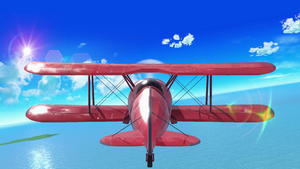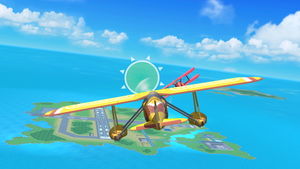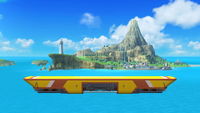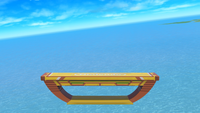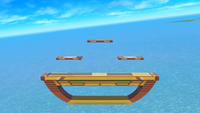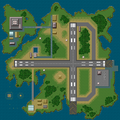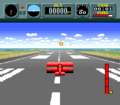Pilotwings
| Pilotwings Pilotwings | |
|---|---|
 Pilotwings as it appears in Smash. | |
| Universe | Pilotwings |
| Appears in | SSB4 (Wii U) Ultimate |
| Availability | Starter |
| Crate type | Normal |
| Maximum players | 4 (Wii U) 8 (Wii U Ω form, Ultimate) |
| “ | This stage is inspired by both Pilotwings and Pilotwings Resort, which takes you on an aerial tour of the runway and Wuhu Island as you battle. Be careful not to fall when the planes switch! | ” |
| —Super Smash Bros. 4 Official Site | ||
Pilotwings (パイロットウイングス, Pilotwings) is a stage in Super Smash Bros. for Wii U and Super Smash Bros. Ultimate. The stage is set in the third level of Pilotwings and Wuhu Island, the main world of Pilotwings Resort.
Stage overview[edit]
Combatants fight atop the wings of a red biplane as it flies through rings in the sky over a flat, 2D island. The top wings of the biplane serve as soft platforms, while the bottom wings are semisoft. The cockpit in the middle is a solid wall, splitting the lower half of the stage in two. The stage tilts as the plane makes turns in the air.
After some time, the fighters will be dropped onto a yellow monoplane which flies towards and over Wuhu Island. The wings of this plane form a semisoft platform. The rotors below the wings can be stood on, but this is risky to attempt, as their edges cannot be grabbed. When players are launched, they may rebound off the terrain off the island, which may KO them but can also save them when they would otherwise have continued past the blast line. Miis can be seen flying with Rocket Belts from Pilotwings Resort.
The yellow plane will eventually make its way back to the first island and drop players onto the red biplane, starting the loop over again.
In Ultimate, the rotors of the yellow monoplane can be grabbed, making fighting in that area notably safer. The stage will also make a warning sound whenever the planes transition.
Ω forms and Battlefield form[edit]
In Super Smash Bros. for Wii U, the Ω form is set on a floating platform with the color scheme of the yellow plane which appears to have a design of aircraft structure at the bottom. Like Wuhu Island the stage tours the same area but take a different path. The planes can still be seen in the background.
In Super Smash Bros. Ultimate, the main platform of the Ω form and Battlefield form is unique to these forms and aesthetically resembles the yellow plane of the normal form. It is also the same size and shape as Final Destination and Battlefield, respectively. The three soft platforms of the Battlefield form are metallic and are also unique to this form.
Hazards Off[edit]
With hazards off in Ultimate, the match remains on the red biplane for the duration of the match. The red plane also never tilts.
Origin[edit]
As a stage named after its series, it originates from both Pilotwings for the SNES and Pilotwings Resort for the 3DS. The red biplane in this stage is the 'Light Plane' used in Pilotwings, and the flat, 2D island is the runway from lesson 3 of Pilotwings. The island is also in lesson 7; however, lesson 3 takes place in the daytime, while lesson 7 takes place at sunset. The yellow plane is modeled after the mono-wing sea planes used in Pilotwings Resort as it flies towards Wuhu Island. Wuhu Island first appeared in Wii Fit and Wii Sports Resort, and is also the main area in Pilotwings Resort. It also appeared in Mario Kart 7 as a track in the game.
The SNES incarnation of Pilotwings is notable for being one of the launch titles for the system in the US and, alongside worldwide launch title F-Zero, was intended to show off a graphical effect known as Mode 7, which allowed background layers to be rotated and stretched in a variety of ways akin to Sega's "Super Scaler" used in titles such as Out Run and After Burner, with the most well known use of the effect being to flatten out backgrounds to be used as faux-3D floors, an effect also replicated by Mute City SNES.
Tournament legality[edit]
Pilotwings is banned in tournaments due to powerful camping spots on both planes, especially the yellow plane's rotors, as well as due to KOs being caused or prevented by the damaging terrain and tilting of the planes. The planes can also impact a character trying to recover, as they can tilt at the wrong moment.
Update history[edit]
- Added 8-player mode version of the stage's Ω form.
 Fixed a visual glitch which caused some models to clip through the screen
Fixed a visual glitch which caused some models to clip through the screen
Gallery[edit]
Super Smash Bros. for Wii U[edit]
The Wii Fit Trainer lying prone on the red biplane.
Super Smash Bros. Ultimate[edit]
Bayonetta, Diddy Kong, Mega Man and Peach fighting around Alolan Exeggutor on the stage.
Names in other languages[edit]
Trivia[edit]
- There are some other small 2D islands spread across the ocean, although they never appeared in the original Pilotwings.
- The yellow plane from Pilotwings Resort has a full glass case over the cockpit, hiding whoever is flying the plane. The cockpit appears open in the respective game.
- The islands from both Pilotwings and Pilotwings Resort are portrayed as existing in the same area of the ocean, but this is not true as neither neighbouring island can be seen in each game.
- In Super Smash Bros. for Wii U, during the moment where the yellow plane flies over the volcano on Wuhu Island, the plane engine stalls and the propeller comes to a near halt before resuming during the descent. This detail is not carried over to the Super Smash Bros. Ultimate version of the stage.
- On the bi-plane section of this stage, the point rings take the form of the old design from the original Pilotwings, and as the stage changes to the yellow plane, the rings take on the new design from Pilotwings 64 and Pilotwings Resort.
- The Super Smash Bros. Direct incorrectly referred to this stage as "Pilot Wings".
- Wuhu Island also appears as its own stage, using the same model as this stage, with some minor changes. These are the only two separate stages to share most of their background geometry aside from Battlefield and Big Battlefield. The SNES Pilotwings island is not visible on the Wuhu Island stage, however.
- Inside the cockpit is a low-poly, textureless Mii head.
- In Ultimate, the following Assist Trophies cannot appear on this stage: Burrowing Snagret, Color TV-Game 15, Ghosts and Knuckles. Additionally, Marshadow cannot be summoned by a Poké Ball here.
|
| |
|---|---|
| Stage | Pilotwings |
| Item | Rocket Belt |
| Masterpiece | Pilotwings |
